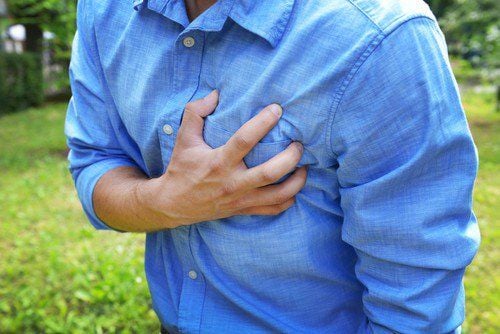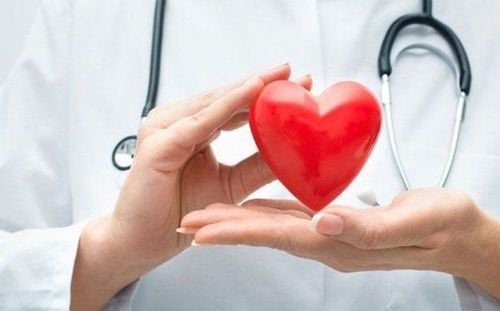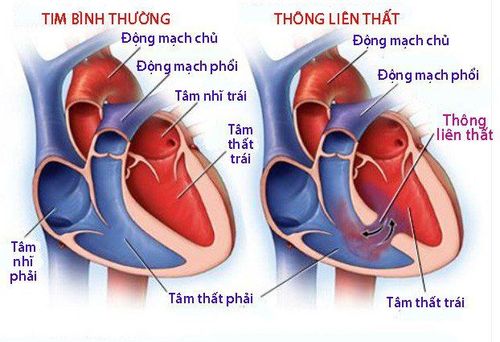This is an automatically translated article.
The article is professionally consulted by Master, Doctor Pham Van Hung - Department of Medical Examination & Internal Medicine - Vinmec Danang International General Hospital.
Tricuspid valve malformation or Ebstein heart disease (English name is Ebstein anomaly) is a congenital heart defect. In it, the tricuspid valve - the valve between the two right heart chambers (right atrium and right ventricle) doesn't work properly.
1. What are the symptoms of tricuspid valve malformation?
Tricuspid valve malfunction is when the tricuspid valve attaches lower than normal in the right ventricle and the leaflets of the tricuspid valve are formed abnormally, resulting in blood flowing backwards through the tricuspid valve, making the heart work less efficiently. .If the severity of Ebstein's heart disease is mild, the person may not develop symptoms until adulthood. Signs and symptoms may include:
Shortness of breath, especially with exertion Fatigue Palpitations or irregular heartbeat Cyanosis of lips and skin due to lack of oxygen.
2. When to see a doctor?
If you or your child has signs or symptoms of heart failure, such as feeling tired or short of breath even with normal activities or blue lips and fingernails, take your child to the hospital. Medical examination to determine if these symptoms are due to heart disease. If it is due to heart disease, your doctor will refer you to a cardiologist for a more in-depth examination.3. How does Ebstein's heart disease affect the body?
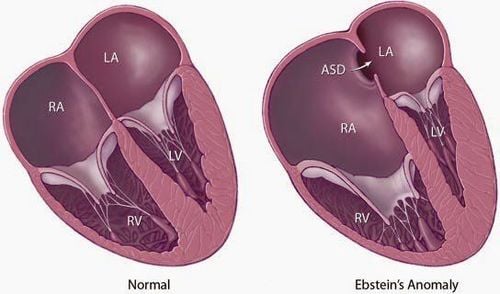
To understand how Ebstein's heart disease affects your heart, first, you need to understand how a heart works normally:
Your heart is made up of four chambers: The upper two chambers ( The atria) work to collect blood, and the two lower chambers (ventricles) work to pump blood. The valves of the heart are especially important in keeping blood flowing in one direction, allowing blood to flow from the atria to the ventricles and from the ventricles out of the heart. The valves control the flow of blood through the heart by opening and closing each time the heart contracts. The valve's opening and closing functions are controlled by the pressure difference between the chambers of the heart and certain muscles located in the heart. Oxygen-poor blood returns from your body and flows into the right atrium. Blood then flows through the tricuspid valve and into the right ventricle, pumping blood up to the lungs to take in oxygen and expel carbon dioxide. On the other side of the heart, oxygen-rich blood from the lungs flows into the left atrium, through the mitral valve, and into the left ventricle, where it then pumps the blood throughout the body.
4. What Happens With Ebstein's Heart Disease?
In Ebstein's heart disease, the tricuspid valve lies lower than normal in the right ventricle. This makes it part of the right atrium and causes the right atrium to be larger than normal, the leaflets of the tricuspid valve (the valve that connects the right atrium and the right ventricle) not to close together. . This abnormality causes some of the blood to flow back to the right atrium instead of being pumped into the pulmonary artery to reach the lungs and exchange oxygen in the lungs, thereby making the amount of oxygen in the blood low, the heart has to work harder. to pump blood to the lungs, as well as lack of oxygen to the body's organs.The low position of the valve and the extent of the abnormality can vary from person to person so symptoms can range from mild to severe.
The greater the tricuspid regurgitation, the more the right atrium must dilate as it receives more blood. At the same time, the right ventricle dilates to try to cope with the leaky valve and bring blood to the lungs. As a result, the right chambers of the heart enlarge (hypertrophy) and as the heart muscle weakens, it can lead to heart failure.
Several other heart conditions may be associated with Ebstein's heart disease such as:
There is a hole between the two chambers of the heart Arrhythmia Wolff-Parkinson-White (WPW) syndrome.
5. Risk of tricuspid valve malformation
Congenital heart defects, such as Ebstein's heart disease, often occur early in fetal heart development. Currently, scientists do not know what causes this condition, so it is not certain what risk factors increase the likelihood of Ebstein's heart disease. Both genetic and environmental factors are thought to play a role in the disease, and people with a family history of heart defects may be more likely to have Ebstein's heart disease or to be exposed to it during pregnancy. Some drugs, such as Lithium, can lead to this defect.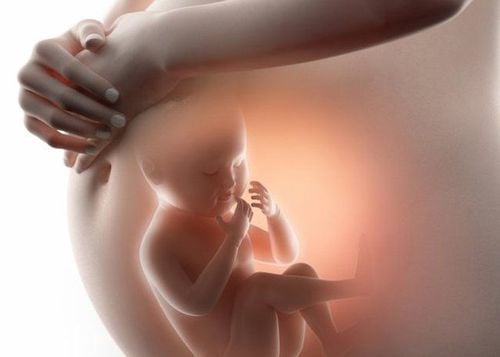
6. Diagnosis of Ebstein's Heart Disease
To diagnose Ebstein heart disease, your doctor may review your signs and symptoms and conduct an exam. If your doctor suspects an underlying problem, such as congenital heart disease, or if you have other signs and symptoms that may suggest Ebstein heart disease, your doctor may order some tests, such as:Echocardiography to evaluate the structure of the heart, the tricuspid valve and blood flow through the heart. Transesophageal echocardiography. An electrocardiogram (ECG) to detect abnormalities in the heart's rhythm and structure. A chest X-ray shows if the heart is enlarged, it may be due to Ebstein's heart disease. Cardiac MRI to determine the severity of the disease, to look in detail at the tricuspid valve, and to evaluate the size and function of the right ventricular chamber. The blood pressure holter is an ambulatory blood pressure monitor (ABPM). As an automatic blood pressure monitor, monitoring blood pressure continuously 24 hours in outpatient conditions, during the day the device can measure every 15-30 minutes/time and at night every 30 minutes/hour/time, in patient conditions working, eating, sleeping and living normally. Pulse oximetry to measure the amount of oxygen in the blood. Exercise stress test Electrophysiology study Cardiac catheterization.
7. Ebstein's Heart Disease Prevention
Many people with mild Ebstein's heart disease have few complications. However, you may need to take some precautions in some situations:Daily activities: If the degree of Ebstein's heart disease is mild with a near-normal heart size and no arrhythmia, you can participate in most physical activities like other healthy people. Depending on your signs and symptoms, your doctor may recommend avoiding certain contact sports, such as football or basketball. Your doctor can help you decide which sports activity is right for you. During pregnancy: In many cases, women with mild Ebstein's heart disease can still give birth safely. If you plan to get pregnant, be sure to talk to your doctor before getting started. Your doctor can tell you if it's safe for you to get pregnant and how often throughout your pregnancy and delivery. In addition, to support pregnancy, your doctor may use other treatments before you become pregnant. Pregnancy is a risk factor for the heart, adding to the burden on the heart and circulatory system not only during pregnancy, but also during labor and delivery. However, in some cases it is still possible to have a normal delivery. Rarely, serious complications can be fatal to the mother or baby. Other possible complications from Ebstein's heart disease include heart failure, heart rhythm problems and, less commonly, sudden cardiac arrest or stroke.
8. Treatment of tricuspid valve malformation
Treatment for Ebstein's heart disease depends on the severity of the defect and the person's signs and symptoms. The goal of treatment is to relieve your symptoms and avoid future complications, such as heart failure and arrhythmias. Treatments may include:Regular monitoring If you have no signs or symptoms or an irregular heartbeat, your doctor may only recommend careful monitoring of your heart condition with a physical exam frequent.
Follow-up visits usually include a physical examination and testing. Tests may include an electrocardiogram, echocardiogram, Holter blood pressure, and a stress test.
Medicines If you have an arrhythmia, medication can help control your heart rate and maintain a normal heart rhythm.
Based on the patient's symptoms, the doctor prescribes drugs, such as diuretics and other drugs. You may also be given medicine to prevent blood clots if you have certain heart rhythm problems or have an atrial septal defect.
Some babies may be given medication to widen the connection between the two main blood vessels leading from the heart, the aorta and pulmonary artery, to increase blood flow to the lungs. Other pediatric patients may also be prescribed an inhaler called nitric oxide to help improve blood flow to the lungs.
Surgery Your doctor may recommend surgery when the symptoms of the disease affect your quality of life, even though the symptoms are mild, your heart begins to enlarge and the overall function of the heart begins reduce. Because Ebstein heart disease is so rare, choose a surgeon who is trained and experienced in performing Ebstein heart surgery procedures.
Vinmec International General Hospital currently has all the professional conditions and technical means to perform diagnostic and treatment methods for tricuspid heart valve malformations. At Vinmec, there is a team of highly qualified and experienced cardiologists; modern medical equipment, up to international standards; professional service quality, helping to improve the efficiency of disease diagnosis and treatment.
You can directly visit and treat at Vinmec Health System nationwide or register online HERE.
Master, Doctor Pham Van Hung has 30 years of experience in examination and treatment of internal diseases, especially in Cardiology: coronary arteries, heart failure, heart valves, arrhythmias. ..Master, Dr. Hung used to hold the position of Deputy Head of Internal Cardiology Department and Head of Interventional Cardiology Unit at Da Nang General Hospital and is currently working at Department of Medical Examination and Internal Medicine, Internal Cardiology, and Cardiology. Interventional circuit at Vinmec Da Nang International General Hospital.
Please dial HOTLINE for more information or register for an appointment HERE. Download MyVinmec app to make appointments faster and to manage your bookings easily.
Reference source: Mayoclinic.org





